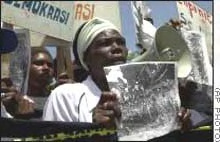
| Want to send this page or a link to a friend? Click on mail at the top of this window. |
| First published in The Unity Newspaper, December/January 1987/88 |
| Haitians: a people in search of freedom |
| _________ |
| By YVES A. ISIDOR |
They were poor men, farmers, intellectuals, nationalists, fathers, mothers, sons, and daughters. Haitians came, for example, to America legally and illegally. Some came by plane and others came by boat. They came in search of safety, educational and economic opportunities, hoping to begin a new life.
Atoine Thurel, 56, was among those who arrived and settled in the Boston area. Like many before him, he came hoping to find temporary refuge from poverty, illegal imprisonment, extortion, and assassination by the dread "Tontons Macoutes," Haiti's secret police.
The political and socio-economic conditions that prompted Thurel and his nearly one million countrymen to depart Haiti did not disappear with the abdication of Baby Doc on February 7, 1986. Today, under the "new" leadership of General Henrie Namphy, a summa cum laude graduate of the Duvalierist school of state terrorism, citizens of Haiti find themselves in the same exact pitiful condition as before.
 |
| We want justice! |
Nothing has changed in Haiti, except that the country is now poorer and more than six hundred people have lost their lives in political violence. As Baby Doc stole into the night, he took the bulk of the national treasury along with him. As he grows fatter in the south of France, the people of Haiti grow angry.
They grow hungry for a representative government. A representative government could mean food, health care, shelter, education, and a good criminal justice system.
They grow angry about the death of Thurel on the steps of the State House in Boston on August 31, 1987. Thurel set himself afire as an act of protest against what is happening in Haiti.
In his last note to the world, he spoke of his love for his country: "because of my many difficulties and family responsibilities, I want to offer myself in holocaust for the complete liberation of my country."
A husband and father of six, Thurel worked as a taxi driver. He felt he had a patriotic and moral obligation to offer himself in holocaust for the complete liberation of Haiti. His fellow Haitian compatriots are saddened and offer their support and love to his family.
They will remember him as a good and honest man who was victimized by the tyranny and brutality of the Haitian government.
Thurel's self-immolation led many reporters and politicians to call my home wanting to know whether he was depressed and politically active.
Few were concerned about or asked what are the social and political issues in Haiti that bring a man to such a decision.
Few asked about the overall mood of Boston's Haitians who live in fear of reprisals against their families remaining in Haiti.
Life for Boston's Haitian community is mixed with resignation, hope, frustration, fears, and determination. Some of them have been more successful in their adopted city than others. A minuscule group of them have decent jobs or own small business ventures. They may also own cars or perhaps homes. But the vast majority of them owns next to nothing.
In the meantime, often two or three families must share a substandard apartment. Boston's Haitians often do not have access to medical care and other basic social services.
Those who treasure freedom are united in their resolve to see an end to the destruction of their people.
They view Thurel's act of sacrifice as something that will remain on the minds of many Haitians and friends of Haiti for many years. Through the midst of their grief, Boston's Haitians are left with the determination to see an end to the killings and devastation of their people and land.
Haitians will surprise the world when the majority of them master their own destiny for the first time in history.
Yves A. Isidor is a member of the Committee of Solidarity with Haiti, commonly known as COSA.
| Wehaitians.com, the scholarly journal of democracy and human rights |
| More from Wehaitians.com |